Maldives country guide

1.0 Welcome to The Maldives:
Congratulations on picking such a beautiful area of the planet to live. All the clichés about the Maldives are true- beautiful beaches, palm trees, 30˚C sunshine everyday whilst sipping expensive cocktails. However, there is the side of life that the tourist brochures don’t portray. Maldives is a 100% Sunni Muslim country, and a land of extremes. Western style hedonism across the lagoon from a small, traditional fishing island.
Until recent years, foreigners weren’t allowed to visit local islands without permission and so Maldivians living in the more remote islands may never have seen a westerner before. Expect to be treated like Angelina Jolie/Brad Pitt when you first arrive- children shaking your hand, taking your picture and screaming your name. Even after a year on the same island, children will still be incredibly excited to see you.
Male, the capital city, is one of the most densely populated islands in the world with around 150,000 people living on less than one square kilometer. Even here, you might attract the stares of curious locals, especially if you stray away from the areas where tourists frequent. Whilst it might make you a little uncomfortable, the locals do not mean to be intimidating, they are just curious about why you are there and not in a resort. A smile and a hello will break the tension, and will probably result in lots of loud laughing.
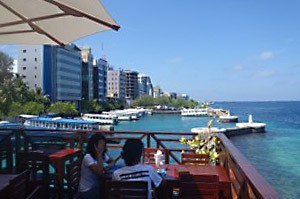
Male Harbor
Foreigners who come to do “something,” and especially teachers, are very well respected here. Crime is practically non-existent, and island life feels very safe. Older Maldivians often speak little or no English, but will go out of their way to make you feel welcome.
In 2011, the Maldives “graduated” to the status of Middle Income Country, something that few Less Developed Countries have achieved. This has resulted in a lot of transition for the country, many larger non-government organizations left the country as they felt that their resources would be better utilized elsewhere. This has left the country in a little bit of limbo, especially as some islands are still recovering from the 2004 tsunami.
Teaching on a local island will enable you to see authentic Maldivian life, rather than the extravagant $250+ (and up to $10,000) a night experiences that most foreigners have. Come experience island life with all its fun and frustrations!
1.1 Geography:
The Maldives is 99% water, made up of over 1,000 islands; however nobody knows the true number. Of these, around 200 islands are inhabited and 100 or so more host the luxury resorts.
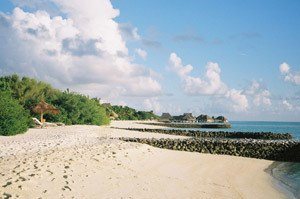
The Maldives is in the Indian Ocean, straddling the Equator and from top to bottom is a distance of around 500 miles. To the north is India, and to the northeast is Sri Lanka, both of which are about an hour’s flight away. To the east, west and south there is nothing except the Indian Ocean!
2.0 Teaching Jobs in the Maldives:
There are three ways you can start teaching in the Maldives:
- Teaching in a government school
- Teaching in a private school in Male
- Teaching in a resort.
DO NOT ARRIVE IN THE MALDIVES WITHOUT SECURING YOUR TEACHING JOB IN ADVANCE.
Maldivian immigration will expect you to be able to prove what you are doing, where you are going and who is responsible for you. If you can’t do that, they will make life very difficult for you. Tourist visas are usually valid only for 30 days, and visa runs are impractical, expensive and schools here will not employ foreigners on a tourist visa.
Most expatiates will teach in government schools, and will be employed directly by the Ministry of Education. You might be given the status of volunteer, but will still receive a similar salary and benefits as other expatiates. The best and most common way to secure a paid teaching placement is through your local Maldivian High Commission, the London High Commission having a regular program to employ graduates and qualified teachers.
CELTA/TEFL courses are not required, but will help if you have no teaching experience. If you are responsible, a graduate and have some experience working with children, it is likely you will be able to secure a job here.
Resort jobs and private school jobs are difficult to come by and usually require a Post Graduate Certificate in Education (PGCE) and several years experience. Jobs in the Maldives is a good place to keep an eye on.
2.1 What’s teaching like in the Maldives?
- Teaching in Maldives is not like your stereotypical Asian classroom. The children are not afraid to shout, be naughty and generally ignore the teacher. Do not fear though, despite a classroom that occasionally resembles feeding time at the zoo, after a few lessons the children will begin to respond to your teaching style and calm down.
- Many teachers in the Maldives are from India and Sri Lanka, and despite following a British curriculum of Cambridge ‘O’ levels and ‘A’ levels, the children are not used to British accents. One class recently confided in me that it took them around six weeks to completely understand my accent – something that I was mortified about. Depending on your school, there may also be a reliance on “chalk and talk”, especially if there are few resources. There is a shift now to try and encourage more interactive lessons, to encourage the children to think for themselves and to develop skills such as team working. However, this is very new to the children, and some don’t know how to react to it. One memorable lesson for me was asking a new class to draw a poster showing the work they had learn’t that week and being met with blank stares. Despite being eleven years old, they had never been asked to make posters in class before.
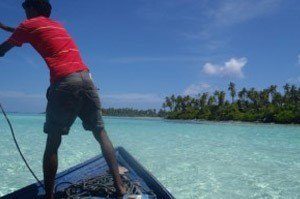
- 2.2 Who should I teach?:
“Who should I teach?” and “who will I teach?” are two very different questions in the Maldives. Many schools, especially on the smaller islands, will teach children all the way from Grade one up to their ‘O’ levels or ‘A’ levels.
- BE PREPARED TO BE FLEXIBLE. The subjects and ages you teach may change on termly basis (or perhaps even monthly if you’re unlucky). Your contract is likely to just say “teacher” and so schools may ask you to take other subjects or other grades, especially if there is a teacher shortage. I was interviewed as an ESL or geography teacher, was offered a contract teaching a completely different subject at ‘O’ level, and then when I had arrived I was told that I was actually teaching ‘A’ level. In my second year here, I was then asked to teach another new subject, this time to middle schoolers.
Generally speaking though, you will only teach children, either in Primary or Secondary. Some teachers will teach middle school children, which includes the older primary and younger secondary classes, but this is quite rare.
- 2.3 Arrival time and preparation:
The time you are expected into school generally depends on which session you are teaching.
- Morning session teachers will be expected to be in school between 06.30-06.50 am, ready for classes at 7.00 am, whereas afternoon session teachers will normally arrive between 11.00 am-12.30 pm, ready for classes at 1.00 pm.
- All schools will expect you to submit lesson plans, either daily or weekly, depending on your particular school and the age you teach. Whilst these do not have to be minutely detailed, or followed to the letter, your supervising teacher will expect to be able to be able to read them and have at least a vague idea of what you are planning on teaching that day. It’s likely you’ll have a lot of free time in school, so there’s no excuse to not have them prepared.
- 2.4 Resources:
All students are provided with a least one core textbook, for every subject, but the government. The quality of these can vary but for the older students taking their ‘O’ levels and ‘A’ levels, these are often the same books that students in the United Kingdom will be using.
Aside from these, often schools will have little in the way of resources so you will have to think creatively. School libraries are often a mishmash of Enid Blyton, Harry Potter to obscure books more suited to a university library. Schools will often receive donated books from various non-government organizations and publishers from Europe and the United States of America. Many of these will be completely unsuitable for a school library.
Generally, schools will have internet access, printers, photocopiers etc to be able to create your own worksheets and lesson resources. Do not be surprised if the internet goes down for hours or if the photocopier runs out of ink for a week. This is due to the general logistics of the country, everything has to be transported by boat. This and anything can take a while to be delivered.
- 2.5 Working hours:
You will either work in the morning or the afternoon depending on the age of the children and your particular school.- As a general rule, secondary classes are in the morning, from around 06.45 am – 07.00 am finishing around 12.30 pm, and primary classes will start around 1.00pm, and end at 5.00 pm. This is because, on many islands, the primary school has started teaching secondary children and they simply ran out of room! Classrooms are then shared between two different grades.
- You are expected to be present in school for your entire session, even if you have lots of free periods or no work , as there might be a last minute meeting or emergency cover.
- If you teach secondary, there will probably also be a requirement that you take extra, evening classes for some of your students, either for extra practice or to catch up on work. These will run from around 7.00 pm-9.00 pm, but it’s very unlikely you will have to work for all of that time. Extra classes become more frequent around exam time, and you may be expected to teach in the holidays and at weekends as well. Despite grumbling, the students generally appreciate the classes, often because they would otherwise be bored at home or having to do chores. You may get limited overtime (up to 10% of your salary) for this, but it depends on your contract.
- 2.6 Dress Code: The Maldives is a Muslim country so you will be expected to dress sensitively.
- For men, this is quite simple, a fairly smart shirt (either long or short sleeved), trousers and closed toe shoes. Ties are required on more formal occasions.
- For women, it becomes a bit more complicated. Whilst you are not expected to cover your hair, clothes should be loose fitting and modest. Women here will wear dresses over trousers, ensuring both their chest and backsides are covered.
- Maldivian people are generally smaller than westerners, so if you are particularly tall or large, you may struggle to find clothes. However, every island will have a tailor who will custom make clothes for you within a few days. This is a cheap way of getting clothes made that meet local requirements
Every island is different in what is and is not acceptable. On some islands it is perfectly acceptable to wear knee length shorts and skirts, on others, a flash of ankle will attract stares. - It’s better to arrive and be overdressed than to be too “western” and cause offense.
- A word of advice: if you have a tattoo, try and keep it covered. Tattoos are banned in Islam, and whilst nobody is bothered if you have one, the children will be obsessed with it, constantly asking to look and touch it. Save yourself some hassle if you can and just don’t let them see it!
- 2.7 When should I come?:
The academic year runs from January to November, and most jobs start in January (but may require you to arrive in late December). However, jobs also do pop up in March and June, around the school holidays, as expatriate teachers decide to quit, or simply don’t return to the school after the holidays! - Resort jobs and private school jobs in Male’ are usually advertised year round.
- 2.8 Working Visas:
You cannot work here without the appropriate visa (either a working visa or a volunteer’s visa, depending on your contract). Do not attempt to turn up without a job and visa in place, customs simply won’t let you into the country. Your visa fees will be paid by your employer and will be arranged in Male. You’ll need two passport photos for your ID card, and it’s worth bringing them with you.
- 2.9 Pay:
The wages you’ll receive will depend largely on your contract, however they will be low compared to most places in Asia.- If you are employed as a “volunteer”, you will receive around £250-£300 a month, with your rent and bills paid for (cable TV, gas and electricity. Internet is extra). If you are on a full teaching contract, this is likely to rise to around £500-£600 a month. The cost of living is low out here, and it is possible to live comfortably on this wage. Weekend and holiday visits to resorts are definitely possible.
- These figures are based on island wages, but are likely to be higher in private schools, Male and the resorts. If you can negotiate a contract that pays in dollars, then do so. The local currency is incredibly weak, and at the end of your contract you may be stuck with local currency that you can’t exchange.
- Private tutoring is possible, and pay between £10 and £20 an hour, but you may be able to negotiate a higher rate as a native English speaker. You must check that your school is ok with you taking on private tutoring though, and whether it is allowed with your contract. Don’t try and do it secretly… there are no such things are secrets when you live on an island!
- Do also remember, that tutoring wages may be high because of supply and demand, and that there are shortages of teachers that offer tutoring on your island. Just because you can charge a higher price, it doesn’t mean that you should…some families are still very poor here.
- 2.10 Tax:
Simply put, there is no income tax in the Maldives. There is talk of charging tax on top earners who earn of 50,000MRF a month, but you will never earn that much as a teacher!
There are other taxes that you need to be aware of though. Goods and Services tax was introduced in 2011, and currently stands at 6.5%. Some shops include this in their prices, whilst others don’t. It’s worth checking this beforehand.
- 2.11 Class Sizes:
These vary greatly depending on the school and island. Most classes hover around the 20-25 size, but are never larger than around 30. Some classes may have as few as 10 or 12 children. If you teach ‘A’ level classes or a subject that isn’t too popular with the students, you might find that you have classes as small as 5 or 6.
- 2.12 Discipline:
Once again, this will very much depend on your school, island and, particularly, your principal. The children generally fear the Maldivian teachers, after all, in an island of 1000 people, there’s a very big chance that the teacher is also related to them or is a friend of their parents!
Because of this, expatiate teachers sometimes get a bad time – the kids don’t have that same level of fear and will try it. Most of the expatiates here are from India or Sri Lanka, so white teachers cause a lot of excitement. Be firm with them, and don’t be afraid to call in a more senior teacher if needed. Local teachers passing by will also stick their head in and yell at the class if needed.
One of the biggest challenges I found with discipline if that some children will miraculously “forget” all of their English, and will only speak to you in Dhivehi (the local language). Insist that they speak in English, or call for another teacher to come and help you out.
- 2.13 Health Insurance:
- Basic health care is very cheap out here; a trip to the doctor is about £4.00. You may be able to get it for free, depending on the current government policies.
- HOWEVER, make sure you have full medical coverage, INCLUDING repatriation. The health facilities are very basic, especially in the islands. An emergency flight may be needed and this will be very expensive. In the worst case scenario, medical facilities may not even be adequate in Male, and you will have to taken to Sri Lanka or India for treatment.
- This could cost thousands of dollars, so don’t be stupid, and get full health insurance before you arrive.
- If you get health care as part of your employment package, check out the small print and exactly what is included.
- 2.14 Sickness:
Call the school as soon as possible to let them know you won’t be coming in. Obviously if you are on a 06.45 am start, you may not be able to call until 06.30 am, but let the school know ASAP. Your classes will be assigned to another teacher. Cover work is useful, but not necessary. - If you are off for more than 2 days, you’ll have to submit a medical certificate from the island’s medical center. As you will be receiving a salary, you will be paid as normal.
One word of advice, once word gets out that you are sick; expect visits from half the island, including your students
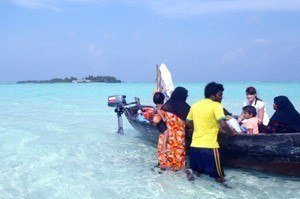
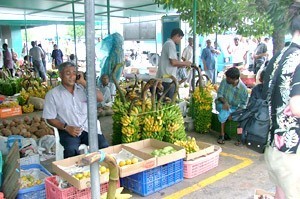
3.0 Money:
- 3.1 Currency: Maldives Rufiyaa (MRF) is the official currency here, but things aimed at tourists will often be priced in American dollars.
- The currency is very weak, so best to not save it up and try and exchange on your last day in the country-you’ll find this a near impossible task. The MRF is currently pegged to the United States of America Dollar (USD$) at an exchange rate of 15.42, but there is a big shortage of dollars, so you might struggle to exchange them.
- Come with plenty of American dollars, these can be changed at any bank, although Bank of Ceylon and State Bank of India will often negotiate on the exchange rate. There is a big black market here, and you’ll likely be approached with an offer to buy or sell dollars at some point whilst you are here. It is illegal to do this, so if you choose to do so, be careful.
-
- 3.2 Cash Machines: There are cash machines all over the place in Male, including a very reliable HSBC ATM. None of them charge for foreign cards, but your bank at home will do (even if you are a HSBC customer, using the HSBC machine!)
- In the atolls, they are much less common, and likely to only be in the atoll capitals, outside of a Bank of Maldives. My two nearest cash points are 30 mins and four hours away by boat! If the ATM isn’t working, then the adjoining bank will probably be able to help.
-
- 3.3 Getting Paid:
You will be paid cash monthly in the last week of the month (usually a Wednesday). It’s very easy to open a bank account (though the bank may be a long way away), so the school will usually deposit some of your salary straight into your bank account if needed. Your pay will always be in Rufiyaa unless you were luckily enough to negotiate a dollar salary.
- 3.3 Getting Paid:
-
- 3.4 Sending Money Home:
Easier said than done. There is a massive dollar shortage here, and not even Western Union will accept rufiyaa for foreign transfers. If you have friends in resorts, they may be able to change your money into dollars for you, or in Male. You may be able to persuade one of the foreign banks to help. Bank of Maldives will not give any foreign currency to any foreigners. Theoretically, locals can change $100 a day, but there is a likely to be a long wait to do this. - Unfortunately, the further you are from Male, the more difficult it is to change your money. Treat your time in the Maldives very much as a working holiday, rather than a chance to save lots of money up.
- 3.4 Sending Money Home:

4.0 Living in The Maldives:
- 4.1 Where should I live? You probably won’t get much choice in this, especially if you are employed through the High Commission. Male and Addu City are the two most Westernized areas of the country, but the cost of living will reflect that. Generally, the further you are from Male, the more traditional the lifestyle is, however that’s not always the case.
- 4.2 Island Life: A small word of warning: island life is a big shock to the system, and can take some getting used to. The island that I live on is 500m wide, 1.5km long, and considered a big island. It’s not uncommon to stand in the middle of the island and see the sea on all four sides. Bring lots of books with you, a laptop (and hard drive with as many films and TV shows as you can fit on it!) and other entertainment.
- Be prepared for constant questions: “Where are you going?” “What are you doing?” “Why are you going there?” It’s not meant to be a rude thing; the islanders are just genuinely curious about the strange westerner on their island, and are perhaps a little worried about you. Be prepared for lots of gossip! Again, it’s not meant to be rude, it’s just the island way. Everybody is related to nearly everybody else, and so they just want to know what’s going on!<
- Maldivians also don’t have a word for “goodbye” in their language. Why would you in such a small community? This means though, they’ll often walk off or hang up the phone without saying anything! Be prepared for it. I’ve introduced “see you later” into the vocab of many people here.
- As a strict Muslim community, there’s no alcohol available, it’s just in the resorts and very expensive. Despite the probable offers of “Smirnoff Sir?”, “Bacardi, Miss?”, it’s never a wise idea to take them up on it.
- Depending on where you are, and the transport available, it may be possible to ‘escape’ to other islands nearby, and if you are particularly lucky, a resort. When booking resorts, make sure you tell them that you are local, this way you can get big discounts. Depending on your island, there may also be people living there who can arrange for you to visit for free. Be careful though… the island grapevines travel far and wide, so don’t get roaring drunk or causing trouble. Your community will almost definitely hear about it!
-
- 4.3 Housing: If you are on a volunteer’s contract, the school will arrange accommodation for you, and there are certain conditions that must be met. You will have your own room, bathroom, access to a kitchen and living room, and have cable TV. It will probably be one of the nicest houses on the island (you get a very generous housing allowance), and will have people around a lot of the time just for a nosy around!
- If you are responsible for sorting out your own house, rent can be anywhere around 1000-300MRF a month (£40-£120) depending on whether you have a room in a Maldivian house or rent a whole house to yourself. Most islands have a huge supply of places to rent, due to the large expat healthcare, teaching and construction communities. It’s worthwhile negotiating rent with your landlord. The school should help you find accommodation.
-
- 4.4 Bills:
On a volunteer’s contract-these are all inclusive. On a full contract, they are still very cheap. Water is free (everyone has a rainwater tank in their house), gas is around £20 for a huge bottle which will last a long time. Electricity is also very cheap, expect to pay around £20-40 a month (this is if you have AC. It would be much less without).Cable TV is about £8 a month, and internet £10 if you use the island’s (slow, wired) connection. 3G modems are available, Dhiraggu usually has the best signal, but are expensive to set up and use.
- 4.4 Bills:
-
- 4.5 Electricity:
The whole country uses British style 3 pin plugs, and it’s fairly reliable, though you might experience powercuts during bad storms.
- 4.5 Electricity:
-
- 4.6 Mobile Phones:
SIM cards are very cheap, Dhiraggu usually offers the best rates, but do check out Wataniya as well. Local calls and texts cost 1MRF each, and each time you top up you’ll receive free texts.
- 4.6 Mobile Phones:
Calling internationally is also relatively cheap. I made a 40min call to a UK landline, followed by a 20min call to a UK mobile for the grand total of £8. If you are Dhiraggu, check out their 016 international calling plan, as it makes calls much cheaper.
If you find yourself calling the same Maldivian number frequently, it’s also worth setting yourself up for the Best Friend plan, to get free calls to that number.
- 4.7 Learning the Language:
- Most people here speak at least a couple of words of English, and are very keen to practice them. Dhivehi is a difficult language to learn, but your students will be keen to teach you (and have a good laugh!).
- There are lots of different dialects though- my students speak island dialect, atoll dialect and Male dialect, so make sure you know which you are learning! I tried my best Dhivehi in Male once, and nobody understood me- I was speaking my island’s dialect and didn’t realise!
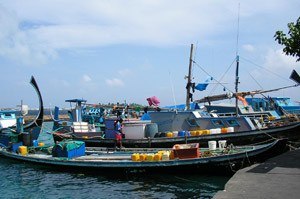
5.0 Food:
Fish, fish, rice, coconut and more fish! It is possible to be a vegetarian here (I am), but be prepared for some difficult days, especially if there is a vegetable shortage, or the rain has delayed the boats.
- Maldivians have fish with every single meal, and it’s usually in combination with rice, coconut, lime and chilli. Those few ingredients make a surprising number of meals! Roshi is the traditional bread here, not dissimilar to a naan or tortilla.
- Pretty much everything is imported here, so be prepared for some odd products in the shops, and island wide shortages of particular items.
- Western brands are popular though, but can be expensive. My local shop, for example sells Corn Flakes, Nutella, Mars Bars for a bit more than their British prices.
- Agora and STO supermarkets in Male are the places to stock up on western brands and treats. Marmite sells for cheaper here than it does in the UK!
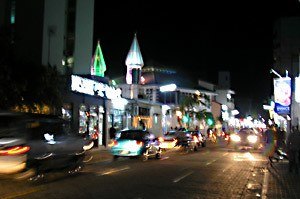
6.0 Going Out: Pubs and Clubs:
- Pretty much impossible due to local laws. The resorts are happy to sell alcohol for a price, but be prepared for your eyes to water. (US$12 is not uncommon for a cocktail, for example)
- The only place to buy alcohol in Male is at the airport hotel (a lot more glamorous than it sounds), and the weekends see a steady stream of expatiates. Prices here also aren’t cheap, with a beer or glass of wine at around the US$7 mark. USD $15.00 Cocktail.
7.0 Transport:
Most people travel around by foot, although motorbikes are becoming increasingly popular, the bigger islands may have a few cars.
Male is particularly manic, taxis and motorbikes everywhere, so be careful when crossing the roads. Technically, pedestrians have right of way on zebra crossings, but don’t count on it. You’ll be an expert jay-walker after just a few days.
- 7.1 Taxis: In Male, taxis are incredibly cheap- just 20 MRF to go any distance, plus a 5 MRF surcharge per bag in the boot. They are fairly easy to get, just flag it down in the street, however it becomes a bit more difficult on hot days (for the air conditioning) or when it’s raining. On other islands, taxis are hard to come by, there may be only one or no taxis for the entire island, but will still be very cheap.
-
- 7.2 Motorbikes: It’s unlikely that you’ll own your own motorbike whilst here, but will often be offered rides on them. Nobody wears helmets here (except in Addu City, where it’s the law), so don’t expect to be offered one. A word of warning though, if you have an accident, your health insurance will probably be invalidated, so make sure you keep safe and trust the driver.
-
- 7.3 Public Transport:
- Only Male and Addu City have buses, both incredibly cheap but not always completely reliable.
- Most public transport takes the form of boats here, either slow dhonis or speed boats. Around Male, the public boat system is very reliable and cheap and for a few MRF you can travel to other islands very easily.
- In the atolls, the boats are likely to be less frequent- perhaps one boat a day to the bigger islands nearby, but the government is slowly trying to improve this.
- The best way to find out about boats is to ask on your island, the schedules and routes constantly change, so best to confirm with a local before making any plans!
- 7.3 Public Transport:
-
- 7.4 Planes: Very expensive, but probably a necessity if you are a long way from Male and don’t fancy a 30 hour boat trip. New airports are being built all the time, so hopefully it will bring some economies of scale and bring the prices down.
8.0 Safety:
Crime is virtually non-existent in the islands, but there have been some cases of expats having laptops and money stolen. Take sensible precautions and you’ll have virtually no problems.
- 8.1 Drugs/Alcohol: Don’t do it. Heroin is the drug of choice here, and if you are caught taking drugs say goodbye to your job and hello to deportation or prison. Don’t even drink alcohol on a local island, despite any reassurances of how “fine” it may be.
9.0 Good Luck!
I an amazing time in the Maldives, and thanks for using ESL Teacher Recruitment. If you have any questions or concerns, please do not hesitate to get in touch and let us know how you get on.
Produced by Laura Hampson
© Copyright licensed to ESL Teacher Recruitment 2015

